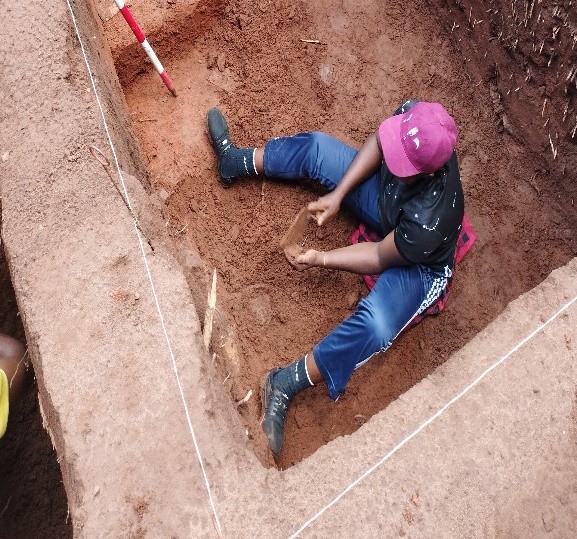




Kenechukwu Chidiogo Daniel (PhD) is a lecturer in the Department of Archaeology and Heritage Studies at the University of Nigeria, Nsukka. She is a 2024 AG Leventis fellow, 2024 fellow of Rewriting World Archaeology (Antiquity), and 2023 fellow of Ife Summer Institute of Advance Studies in Africa.
Kenechukwu is a multidisciplinary Archaeologist whose research interests cut across Environmental Archaeology, Landscape Archaeology, Foraging and Farming, Heritage Studies, Ceramic Studies, Feminism in Archaeology, museum Conservation of Archaeological remains, Sedimentological studies of cave sediments, and Indigenous knowledge systems.
She earned her PhD in 2019, an M.A. in 2014, and a B.A. in 2010, all in Archaeology from the University of Nigeria, Nsukka. Her PhD thesis, titled “Archaeological Investigation of Ojebe-Ogene Clan in Enugu State of Southeastern Nigeria,” examined archaeological resources that have been disturbed by anthropogenic and environmental factors, leading to the loss of archaeological data at the site. Part of her research included a palaeoenvironmental study. Pollen grains retrieved from cave sediments indicated the presence of phytoecological groups representing lowland rainforest and humid conditions, as well as open vegetation and dry conditions. This analysis revealed the vegetation history and palaeoenvironmental conditions of the study area, contributing to the long-term human occupation history of the cave. During dry periods, there were likely minimal human activities in the cave, unlike during humid periods. Charcoal and guano samples found at the site were subjected to accelerator mass spectrometry (AMS) 14C dating at Beta Analytic Inc. in Florida, USA, which returned a date of 4650 ± 30 BP. The palaeoenvironmental study utilizing pollen from guano deposits provided insights into the fluctuating vegetation of the area. The results of her PhD research have been published in the Radiocarbon Journal and the West African Journal of Archaeology. In 2014, she completed her M.A. project titled “Women and Heritage Preservation in Old Nsukka Division,” which focused on the role of women in archaeology and their contributions to the preservation of archaeological materials. Her B.A. project in 2006, titled “Gender and Politics in Archaeology in Southeast Nigeria,” examined women’s roles in politics and food production, with an aspect of the study published in the Cogent Arts & Humanities journal. In 2024, she is working on a project titled “Women as Curators of Heritage Crafts and Knowledge in Southeast Nigeria” under the mentorship of Sarah Semple and Nancy Rushohora. She is also involved in several projects, including “Exploring Uncharted Territories in Igboland, Southeastern Nigeria: Archaeological and Environmental Perspectives,” funded by the Cambridge-Africa ALBORADA Research Fund. Kenechukwu is trained in ceramic analysis, focusing on the study of ceramics in uncharted territories in Igboland, where she analyzes decorative patterns to identify types similar to the typical Igbo-Ukwu ware.
Her research in ceramics studies, cave sediment and feminism leave her in carrying out several excavations, sediment analysis and women study.
“I am ready to interact, learn and make my contributions to the ongoing research as it relates to feminism and Archaeological science (Ceramics and palynology) globally”.
Education
2019- PhD Environmental Archaeology University of Nigeria, Nsukka
2014- Masters Archeology, University of Nigeria, Nsukka
2010- Degree B. A. Archeology, University of Nigeria, Nsukka
Specialization
Environmental Archaeology, Ceramic Studies, Feminism in Archaeology and Sedimentological studies of cave sediments.
Current Status I am currently seeking a post-doctoral opportunity as I am presently engaged in two projects: “Women as curators of heritage crafts and knowledge in southeastern Nigeria” and “Exploring uncharted territories in Igboland, southeastern Nigeria: archaeological and environmental perspectives.”
